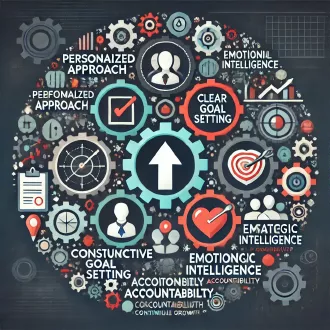Self-Awareness: The Key to Effective Leadership
The first step toward emotionally intelligent leadership is self-awareness. Leaders must be able to identify their own emotions and understand how they affect their behavior and decisions. The practice of self-reflection and continuous feedback are powerful tools for improvement in this area. Ask yourself: How do I respond to stress? How do my emotions affect my performance?
Emotional Regulation: Staying Calm in Critical Situations
Once you know your emotions, the next step is to learn how to regulate them effectively. Emotionally intelligent leaders know how to manage their emotions so they don't let them negatively influence their team. Strategies such as meditation, mindfulness and stress management are key to staying calm in high-pressure situations.
Empathy: Connect with your team
Empathy is a crucial skill for any leader. Understanding and recognizing the emotions of your employees will allow you to respond more appropriately to their needs and concerns. Practicing active listening and demonstrating a genuine interest in your team's well-being strengthens relationships and improves group cohesion.
Communication Skills: Express your Ideas Clearly.
An emotionally intelligent leader must have excellent communication skills. Knowing how to express your thoughts and emotions clearly and effectively helps avoid misunderstandings and conflicts. In addition, open communication fosters a more collaborative and transparent work environment.
Motivation and Resilience: Stay Focused on Goals
Motivation and resilience are essential components of emotionally intelligent leadership. Leaders must be able to keep morale high, even in difficult times. Setting clear goals, celebrating accomplishments and maintaining a positive attitude in the face of challenges are strategies that help keep the team focused and motivated.
Creating a Positive Environment: Fostering Team Well-Being
The work environment plays a crucial role in team dynamics. Leaders should strive to create an environment where team members feel valued and supported. Promoting a culture of respect and recognition helps strengthen the bond between the leader and his or her team, thereby improving overall performance.
Conclusion: The Importance of Investing in Emotional Development
Incorporating emotionally intelligent leadership strategies not only improves a leader's ability to manage his or her own behavior, but also enhances the effectiveness of the team as a whole. Investing in the development of these skills can make a big difference in your professional success and overall satisfaction within the work environment.





